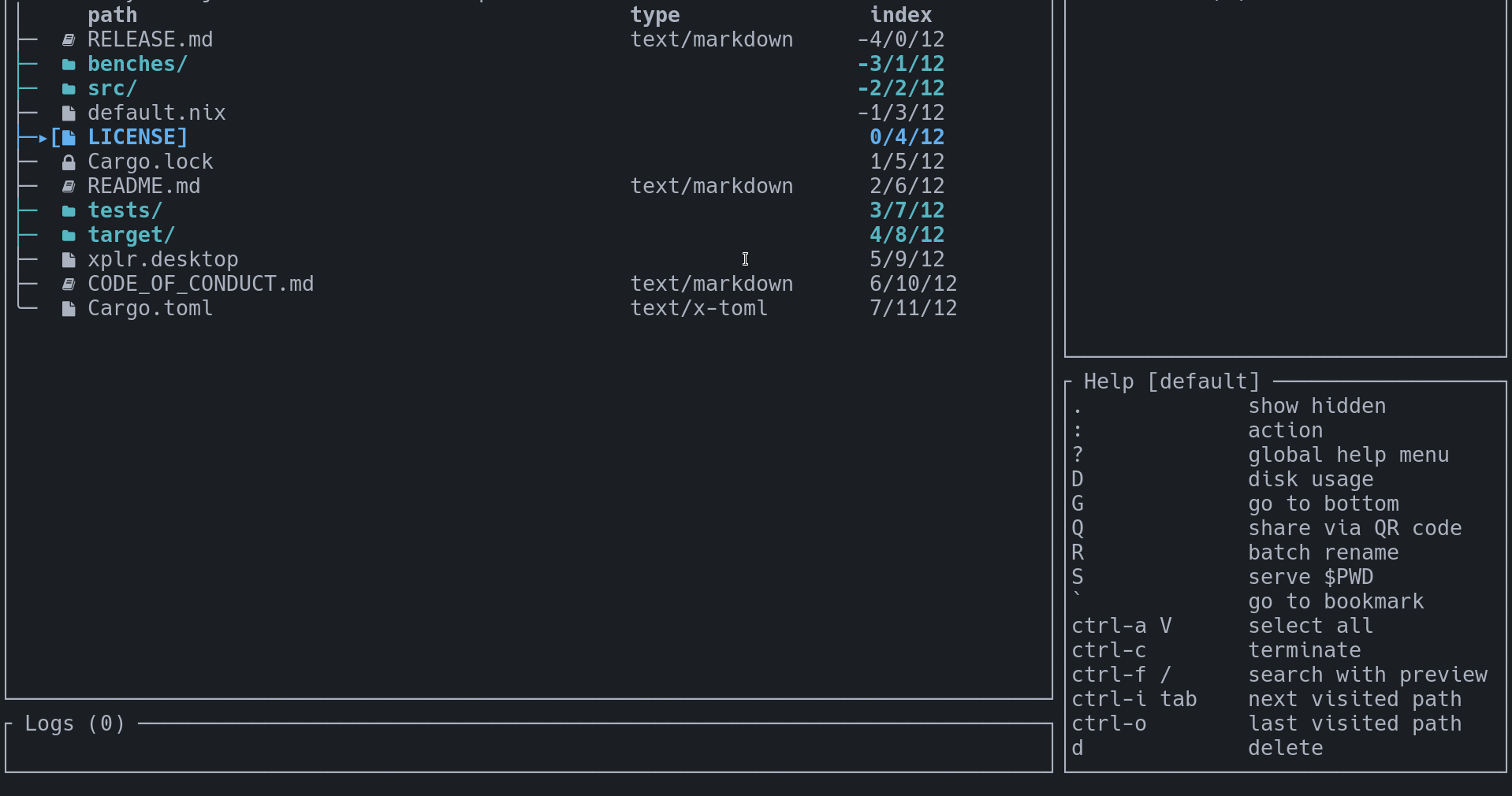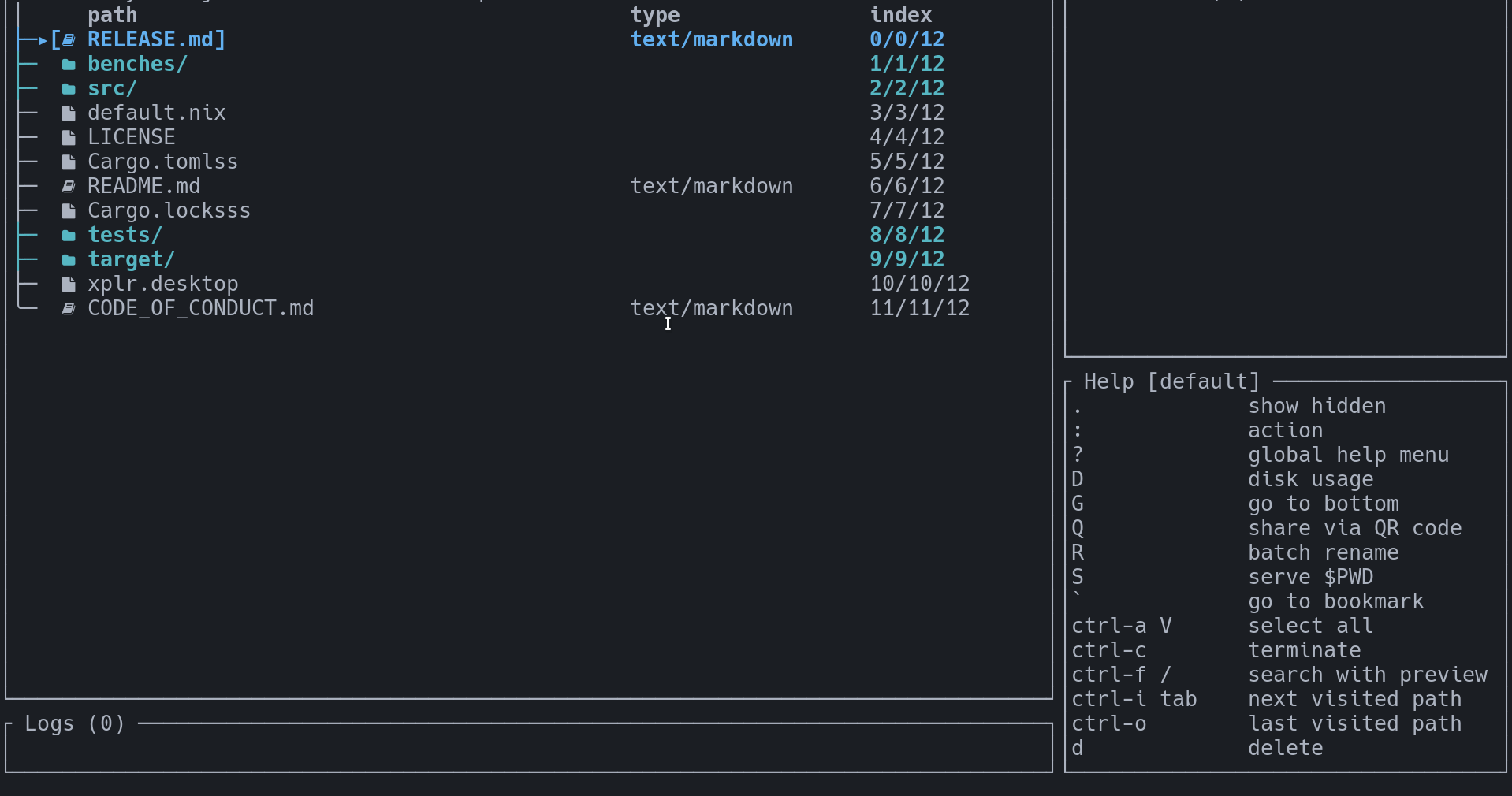Awesome Hacks
Here's a list of cool xplr hacks, i.e. snippets of code that you can just copy and paste into your configuration or the appropriate file, that are too small or too niche for a full fledge plugin.
Do you have something cool to share?
Edit this file or share them here.
You can try these hacks by writing them to a file, say hack.lua and passing
it to xplr with --extra-config or -C.
xplr -C hack.lua
cd on quit
Change directory using xplr.
Expand for details
- Author: @sayanarijit
- Tested on: Linux
NOTE: This is a shell hack, rather than Lua config hack. Add this in
.bashrc or .profile file in your home directory.
With this alias set, you can navigate directories using xplr by entering xcd command, and when you quit by pressing enter, you will enter the directory.
You can of course, quit with plain Quit (i.e. by pressing q) to gracefully cancel "cd on quit".
alias xcd='cd "$(xplr --print-pwd-as-result)"'
Spawn multiple sessions in different tabs (iTerm2)
Creating a new session that starts with iTerm2.
Expand for details
- Author: @lmburns
- Requires: iTerm2
- Tested on: MacOS
xplr.config.modes.builtin.default.key_bindings.on_key["ctrl-n"] = {
help = "new session",
messages = {
{ BashExecSilently = [[
osascript <<EOF
tell application "iTerm2"
tell current window
create tab with default profile
tell current session to write text "xplr"
end tell
end tell
]]
},
},
}
Bookmark
Bookmark files using m and fuzzy search bookmarks using backtick.
Expand for details
- Author: @sayanarijit
- Requires: fzf
- Tested on: Linux
xplr.config.modes.builtin.default.key_bindings.on_key.m = {
help = "bookmark",
messages = {
{
BashExecSilently0 = [===[
PTH="${XPLR_FOCUS_PATH:?}"
PTH_ESC=$(printf %q "$PTH")
if echo "${PTH:?}" >> "${XPLR_SESSION_PATH:?}/bookmarks"; then
"$XPLR" -m 'LogSuccess: %q' "$PTH_ESC added to bookmarks"
else
"$XPLR" -m 'LogError: %q' "Failed to bookmark $PTH_ESC"
fi
]===],
},
},
}
xplr.config.modes.builtin.default.key_bindings.on_key["`"] = {
help = "go to bookmark",
messages = {
{
BashExec0 = [===[
PTH=$(cat "${XPLR_SESSION_PATH:?}/bookmarks" | fzf --no-sort)
PTH_ESC=$(printf %q "$PTH")
if [ "$PTH" ]; then
"$XPLR" -m 'FocusPath: %q' "$PTH"
fi
]===],
},
},
}
Persistent, multi-session bookmark
A bookmark mode that allows for a bookmark file to be used throughout multiples
sessions. It is set to the environment variable $XPLR_BOOKMARK_FILE. A
bookmark can be added, deleted, or jumped to.
Expand for details
- Author: @lmburns
- Requires: fzf, sd
- Tested on: MacOS
-- With `export XPLR_BOOKMARK_FILE="$HOME/bookmarks"`
-- Bookmark: mode binding
xplr.config.modes.builtin.default.key_bindings.on_key["b"] = {
help = "bookmark mode",
messages = {
{ SwitchModeCustom = "bookmark" },
},
}
xplr.config.modes.custom.bookmark = {
name = "bookmark",
key_bindings = {
on_key = {
m = {
help = "bookmark dir",
messages = {
{
BashExecSilently0 = [[
PTH="${XPLR_FOCUS_PATH:?}"
if [ -d "${PTH}" ]; then
PTH="${PTH}"
elif [ -f "${PTH}" ]; then
PTH=$(dirname "${PTH}")
fi
PTH_ESC=$(printf %q "$PTH")
if echo "${PTH:?}" >> "${XPLR_BOOKMARK_FILE:?}"; then
"$XPLR" -m 'LogSuccess: %q' "$PTH_ESC added to bookmarks"
else
"$XPLR" -m 'LogError: %q' "Failed to bookmark $PTH_ESC"
fi
]],
},
"PopMode",
},
},
g = {
help = "go to bookmark",
messages = {
{
BashExec0 = [===[
PTH=$(cat "${XPLR_BOOKMARK_FILE:?}" | fzf --no-sort)
if [ "$PTH" ]; then
"$XPLR" -m 'FocusPath: %q' "$PTH"
fi
]===],
},
"PopMode",
},
},
d = {
help = "delete bookmark",
messages = {
{
BashExec0 = [[
PTH=$(cat "${XPLR_BOOKMARK_FILE:?}" | fzf --no-sort)
sd "$PTH\n" "" "${XPLR_BOOKMARK_FILE:?}"
]],
},
"PopMode",
},
},
esc = {
help = "cancel",
messages = {
"PopMode",
},
},
},
},
}
Another bookmark manager type thing, taken from wfxr's zsh plugin.
Another bookmark manager type thing, taken from wfxr's zsh plugin which has colored output with fzf.
Expand for details
- Author: @lmburns
- Requires: fzf, exa
- Tested on: MacOS
xplr.config.modes.builtin.go_to.key_bindings.on_key.b = {
help = "bookmark jump",
messages = {
"PopMode",
{ BashExec0 = [===[
field='\(\S\+\s*\)'
esc=$(printf '\033')
N="${esc}[0m"
R="${esc}[31m"
G="${esc}[32m"
Y="${esc}[33m"
B="${esc}[34m"
pattern="s#^${field}${field}${field}${field}#$Y\1$R\2$N\3$B\4$N#"
PTH=$(sed 's#: # -> #' "$PATHMARKS_FILE"| nl| column -t \
| gsed "${pattern}" \
| fzf --ansi \
--height '40%' \
--preview="echo {}|sed 's#.*-> ##'| xargs exa --color=always" \
--preview-window="right:50%" \
| sed 's#.*-> ##')
if [ "$PTH" ]; then
"$XPLR" -m 'ChangeDirectory: %q' "$PTH"
fi
]===]
},
}
}
Fuzzy search history
Fuzzy search the last visited directories.
Expand for details
- Author: @sayanarijit
- Requires: fzf
- Tested on: Linux
xplr.config.modes.builtin.go_to.key_bindings.on_key.h = {
help = "history",
messages = {
"PopMode",
{
BashExec0 = [===[
PTH=$(cat "${XPLR_PIPE_HISTORY_OUT:?}" | sort -z -u | fzf --read0)
if [ "$PTH" ]; then
"$XPLR" -m 'ChangeDirectory: %q' "$PTH"
fi
]===],
},
},
}
Batch rename
Batch rename the selected or visible files and directories in $PWD.
Expand for details
- Author: @sayanarijit
- Requires: pipe-rename
- Tested on: Linux
xplr.config.modes.builtin.default.key_bindings.on_key.R = {
help = "batch rename",
messages = {
{
BashExec = [===[
SELECTION=$(cat "${XPLR_PIPE_SELECTION_OUT:?}")
NODES=${SELECTION:-$(cat "${XPLR_PIPE_DIRECTORY_NODES_OUT:?}")}
if [ "$NODES" ]; then
echo -e "$NODES" | renamer
"$XPLR" -m ExplorePwdAsync
fi
]===],
},
},
}
Serve $PWD
Serve $PWD using a static web server via LAN.
Expand for details
- Author: @sayanarijit
- Requires: sfz, fzf
- Tested on: Linux
xplr.config.modes.builtin.default.key_bindings.on_key.S = {
help = "serve $PWD",
messages = {
{
BashExec0 = [===[
IP=$(ip addr | grep -w inet | cut -d/ -f1 | grep -Eo '[0-9]{1,3}\.[0-9]{ 1,3}\.[0-9]{1,3}\.[0-9]{1,3}' | fzf --prompt 'Select IP > ')
echo "IP: ${IP:?}"
read -p "Port (default 5000): " PORT
echo
sfz --all --cors --no-ignore --bind ${IP:?} --port ${PORT:-5000} . &
sleep 1 && read -p '[press enter to exit]'
kill -9 %1
]===],
},
},
}
Image viewer (imv)
Preview images using imv.
Expand for details
- Author: @sayanarijit
- Requires: imv, xdotool
- Tested on: Linux, FreeBSD 13.1-RELEASE
xplr.config.modes.builtin.default.key_bindings.on_key.P = {
help = "preview",
messages = {
{
BashExecSilently0 = [===[
FIFO_PATH="/tmp/xplr.fifo"
if [ -e "$FIFO_PATH" ]; then
"$XPLR" -m StopFifo
rm -f -- "$FIFO_PATH"
else
mkfifo "$FIFO_PATH"
"$HOME/.local/bin/imv-open.sh" "$FIFO_PATH" "$XPLR_FOCUS_PATH" &
"$XPLR" -m 'StartFifo: %q' "$FIFO_PATH"
fi
]===],
},
},
}
$HOME/.local/bin/imv-open.sh
#!/usr/bin/env bash
FIFO_PATH="$1"
IMAGE="$2"
MAINWINDOW="$(xdotool getactivewindow)"
IMV_PID="$(pgrep imv)"
if [ ! "$IMV_PID" ]; then
imv "$IMAGE" &
IMV_PID=$!
fi
sleep 0.5
xdotool windowactivate "$MAINWINDOW"
while read -r path; do
imv-msg "$IMV_PID" close all
imv-msg "$IMV_PID" open "$path"
done < "$FIFO_PATH"
imv-msg "$IMV_PID" quit
[ -e "$FIFO_PATH" ] && rm -f -- "$FIFO_PATH"
Text preview pane
Preview text files in a native xplr pane (should be fast enough).
Expand for details
- Author: @sayanarijit
- Requires: none
- Tested on: Linux, FreeBSD 13.1-RELEASE
local function stat(node)
return xplr.util.to_yaml(xplr.util.node(node.absolute_path))
end
local function read(path, height)
local p = io.open(path)
if p == nil then
return nil
end
local i = 0
local res = ""
for line in p:lines() do
if line:match("[^ -~\n\t]") then
p:close()
return
end
res = res .. line .. "\n"
if i == height then
break
end
i = i + 1
end
p:close()
return res
end
xplr.fn.custom.preview_pane = {}
xplr.fn.custom.preview_pane.render = function(ctx)
local title = nil
local body = ""
local n = ctx.app.focused_node
if n and n.canonical then
n = n.canonical
end
if n then
title = { format = n.absolute_path, style = xplr.util.lscolor(n.absolute_path) }
if n.is_file then
body = read(n.absolute_path, ctx.layout_size.height) or stat(n)
else
body = stat(n)
end
end
return { CustomParagraph = { ui = { title = title }, body = body } }
end
local preview_pane = { Dynamic = "custom.preview_pane.render" }
local split_preview = {
Horizontal = {
config = {
constraints = {
{ Percentage = 60 },
{ Percentage = 40 },
},
},
splits = {
"Table",
preview_pane,
},
},
}
xplr.config.layouts.builtin.default =
xplr.util.layout_replace(xplr.config.layouts.builtin.default, "Table", split_preview)
Tere Navigation
Navigate using the tere file explorer (defaults to type-to-nav system).
Expand for details
- Author: @sayanarijit
- Requires: tere
- Tested on: Linux
xplr.config.modes.builtin.default.key_bindings.on_key.T = {
help = "tere nav",
messages = {
{ BashExec0 = [["$XPLR" -m 'ChangeDirectory: %q' "$(tere)"]] },
},
}

